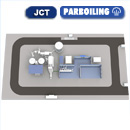Embark on a journey through the inner workings of a rice mill plant, where the simple grain transforms into the perfectly processed jewel that graces tables worldwide. Join us as we delve into the meticulous steps and sophisticated machinery that take rice from field to plate, unraveling the artistry and precision behind every grain. Welcome to the heart of rice processing, where tradition meets technology to deliver the ultimate staple of countless cuisines.
The Importance of Quality Control in Rice Processing Plants
In a rice processing plant, quality control is paramount to ensure that the final product meets the highest standards. From the moment the raw rice grains enter the plant to the packaging of the finished product, every step of the process must be carefully monitored and controlled.
Quality control measures in a rice mill plant include:
- Regular inspection of machinery to ensure proper functioning
- Testing samples of rice at various stages of processing for moisture content, size, and color
- Strict adherence to sanitation and hygiene practices to prevent contamination
- Calibration of equipment to maintain accuracy
Efficient Machinery and Technology for Optimizing Rice Milling
When it comes to optimizing rice milling, having efficient machinery and technology is essential. Imagine a rice mill plant where every step of the process is perfectly orchestrated to produce the highest quality rice. From cleaning and dehusking to polishing and sorting, each stage is meticulously designed to ensure that only the best grains make it to the final product.
One key component of a well-oiled rice mill plant is the use of state-of-the-art machinery. With advancements in technology, modern rice mills are equipped with high-speed dehuskers, precision polishers, and automated sorting machines. These machines not only increase efficiency but also help in maintaining the quality and consistency of the final rice product. By investing in top-of-the-line equipment, rice mill plants are able to streamline their operations and deliver perfectly processed rice to their customers.
Best Practices for Maximizing Yield and Quality in Rice Milling
Rice milling is a delicate process that requires precision and attention to detail to ensure the highest yield and quality of the final product. One of the is to properly clean and prepare the rice grains before processing. This involves removing any impurities, such as stones or debris, and ensuring that the rice is free from any contaminants that could affect the taste or appearance of the final product.
Another key practice for achieving optimal results in rice milling is to control the moisture content of the rice grains throughout the process. Moisture levels that are too high or too low can result in poor quality rice or even damage to the milling equipment. By closely monitoring and adjusting the moisture content of the rice during each stage of processing, rice mill plants can ensure that the end product is of the highest quality and yield.
Innovative Approaches to Sustainability in Rice Mill Plants
Rice mill plants are constantly evolving to meet the demands of a growing population while also considering environmental impacts. One innovative approach to sustainability is the implementation of water-saving technologies such as closed-loop water systems and rainwater harvesting. These systems help reduce water usage and minimize the environmental footprint of rice processing.
Additionally, some rice mill plants are exploring biomass energy solutions to power their operations. By utilizing rice husks and other agricultural waste as biofuel, these plants are not only reducing their reliance on fossil fuels but also turning waste into a valuable resource. This move towards renewable energy sources is a significant step towards achieving sustainable practices within the rice milling industry.
Closing Remarks
In conclusion, the journey through a rice mill plant is truly fascinating, showcasing the intricate process that transforms raw rice grains into the perfectly processed product we all know and love. From cleaning and dehusking to polishing and packaging, each step plays a crucial role in ensuring the quality and consistency of the final product. So the next time you enjoy a bowl of fluffy rice, take a moment to appreciate the incredible work that goes on behind the scenes at a rice mill plant. It's a journey that may seem simple from the outside, but is a true testament to the skill and dedication of the workers involved.

